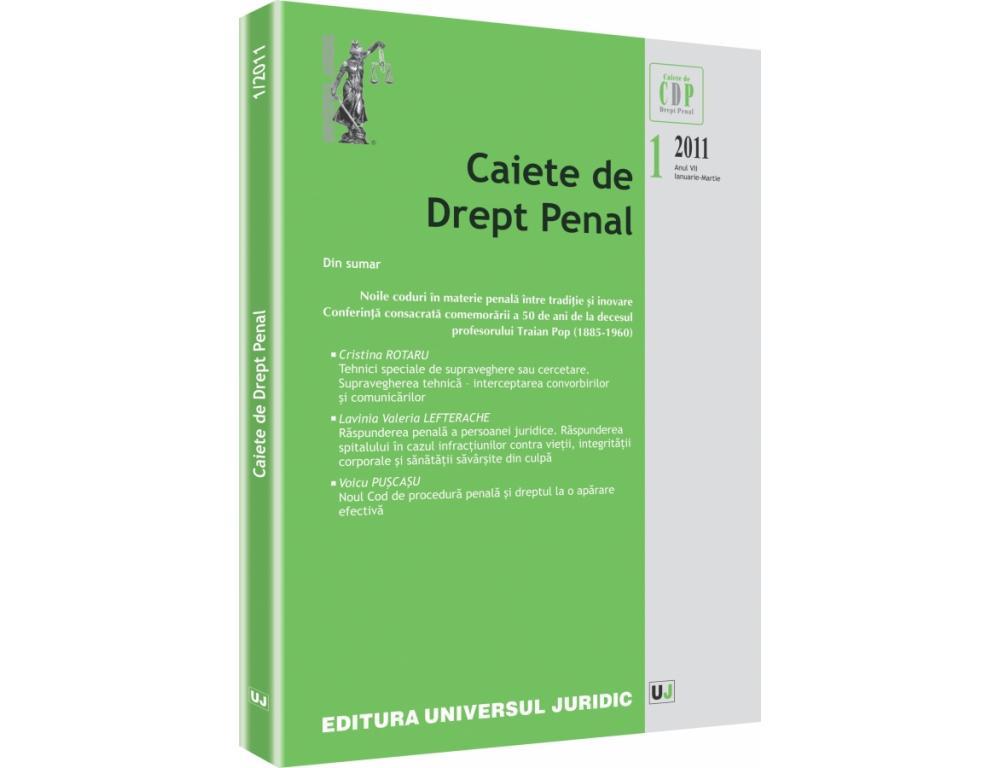Reflectii asupra discontinuitatii reglementarii unor cauze speciale de impunitate. Comparatie între Codul penal în vigoare si noul Cod penal
Discontinuous Settlement of Special Defences to Criminal Responsibility: The Criminal Code in Force vs. the New Criminal Code
Author(s): Mihai DuneaSubject(s): Law, Constitution, Jurisprudence, Civil Law
Published by: Universul Juridic
Keywords: special defences; criminal responsibility; Romanian Criminal Code; new Criminal Code; Some causes for non-punishment or reduction of penalty; illegal causing of abortion;
Summary/Abstract: The main focus of this article is on those special defences to criminal responsibility, provided by the special part of the Romanian Criminal Code still in force, (Act no. 5/1968) which are no longer set out in the same special part of the new Criminal Code (Act no. 286/2009). Thus, referring to the current defence provided by art. 172 para. (1) of the Criminal Code, applicable to offences against state security, the author explains its absence from the new Code, by that it will be settled by general defences to criminal responsibility, as a result of amendments brought to the latter in the new Code. The future penal text is deemed to be better, by that, in order to avoid criminal responsibility, it will no longer be necessary for the perpetrator to give himself up to the police, and thus prevent the completion of the offence, a requirement which is still set forth de lege lata, but which is problematic as to the respect of the legal principle stating nemo tenetur edere contra se. Another legal improvement derives from that the perpetrator will be defended from criminal responsibility, if he alerts the authorities in due time as to the commission of the offence, so that it becomes genuinely possible to prevent its completion, by the intervention of law enforcement agents, no matter if the prevention was effective or if the result of the criminal act did occur due to various malfunctions of the authorities’ work. As regards that defence set out in current legislation, applicable to the medical practitioner who interrupts the course of pregnancy, in a context which criminal law qualifies as an offence, but who does this either in order to save the life, health or bodily integrity of the pregnant woman or by reasons of therapy – a defence provided by art. 185 para. (6) of the Criminal Code in force – the author agrees to the positive character of the future penal provision, according to which this defence will be amended as to become a special justification. The article addresses as well certain inadequacies of the dispositions in the field, set out in the new Criminal Code, such as the apparently inexplicable division between the moments when the special justification may apply, the first referring to the pregnancy period until the 24th week, and the second referring to the pregnancy period following this moment. The study also approaches two defences which might no longer be set out in the Criminal Code, due to the future repeal of those norms from the Criminal Code (special part) which provide the offences to which these defences were applicable. The author refers to the special defence associated to the current offence of failing to report to judicial authorities (art. 265 para. 2 Criminal Code), and to that which applies to the offence of forbidden acts in respect of certain public property (art. 2801 Criminal Code). A last offence analysed in the article is that of bigamy. According to art. 303 para. 3 of the Criminal Code in force, no person commits bigamy if the former marriage has been declared void for a reason other than that consisting of the bigamy state itself. The author addresses the presently incorrect legal nature of this defence, arguing (also in accordance with civil law norms) that the above-mentioned situation could rather represent a special justification which excludes the offence. Thus, it has been stated that the repeal of this text from the future Criminal Code should be interpreted as a tacit acknowledgment by the legislator of a justification which is actually based on the rules applicable in private law, related to voidable marriages, and not as a legal provision that entails more serious legal consequences for the party involved.
Journal: Caiete de drept penal
- Issue Year: 2011
- Issue No: 01
- Page Range: 139-158
- Page Count: 19
- Language: Romanian
- Content File-PDF

